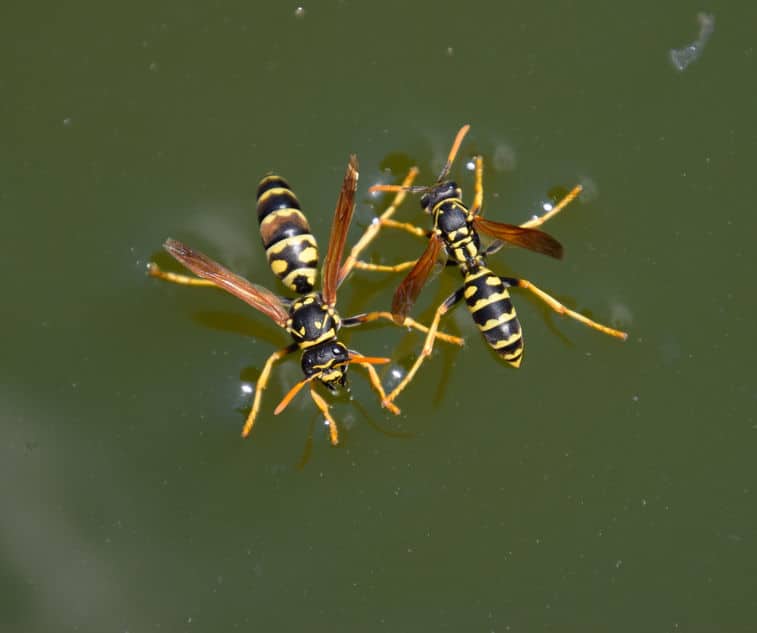You may have seen wasps in your pool and wondered if these insects can swim.
Most wasp species can not swim but 0.3% of species are known to be aquatic and have adapted the ability to swim in water with adapted claws. Wasps are light enough to float on top of the substrate of water. Most wasp species do not want to go underwater and can not swim. However, by closing their spiracles and reducing activity they can survive for days underwater without oxygen.
let’s take a closer look at these aquatic wasp species and just how they can survive underwater for so long.

Can wasps drown?
Wasps can potentially go days without oxygen. Wasps breathe, but not through their mouths. Rather they breathe through tiny holes in their abdomen known as spiracles. If underwater wasps can close these to prevent water from penetrating, and effectively they can hold their breath.
Research has found that wasps alongside other insects such as bees are far more efficient than mammals at processing oxygen.
They can shut down and survive for hours or days. They have a low metabolic rate and can close their spiracles. If you compare Lance Armstrong, the bee, and the hummingbird, the bee is the champion of oxygen delivery.
Physics.org
This research explains why wasps are able to go without oxygen for potentially days as they are so efficient at storing and using it. They can close the holes, spiracles, in their bodies to prevent oxygen from escaping and reduce their activity.
wasps that have been in the water for some time may well appear dead at first sight and may take a considerable amount of time to come round. That explains why wasps we thought dead can make seemingly miraculous recoveries.
Is any wasp aquatic?
According to the journal of Hymenoptera there are only 0.3% of all known species of hymenoptera known to be aquatic. Hymenoptera is a group of insects that include wasps, bees, and ants. (See this article)
One of these aquatic species is the Godzilla Wasp. It has adapted especially long and curved claws that allow it to swim through the surface of the water and even dive beneath it. (source)
The microgaster Godzilla found in Japan hunts down aquatic caterpillars that live on the surface of the water, they are protected from predators from above with a hard shell. The wasps circumvent this protection though by swimming underwater and attacking the caterpillar from below.
Like many solitary wasps, they are parasitoids and insert their eggs into living hosts. Once the eggs have been inserted into the caterpillar they will hatch and the larvae will develop inside the caterpillar, which remains alive, using it as food, eventually eating its way out.
Are wasps attracted to water?
Wasps do need to drink water to survive. While wasps do not like to submerge below water they will drop onto the surface of the water to take water. Most wasps consume all their food in liquid form through the use of a straw-like proboscis.
Does soap water kill wasps?
Soap is known to kill wasps. The soap penetrates their breathing holes, the spiracles on the abdomen. While wasps can close these holes to water, the soap is absorbed so effectively killing the wasp.
